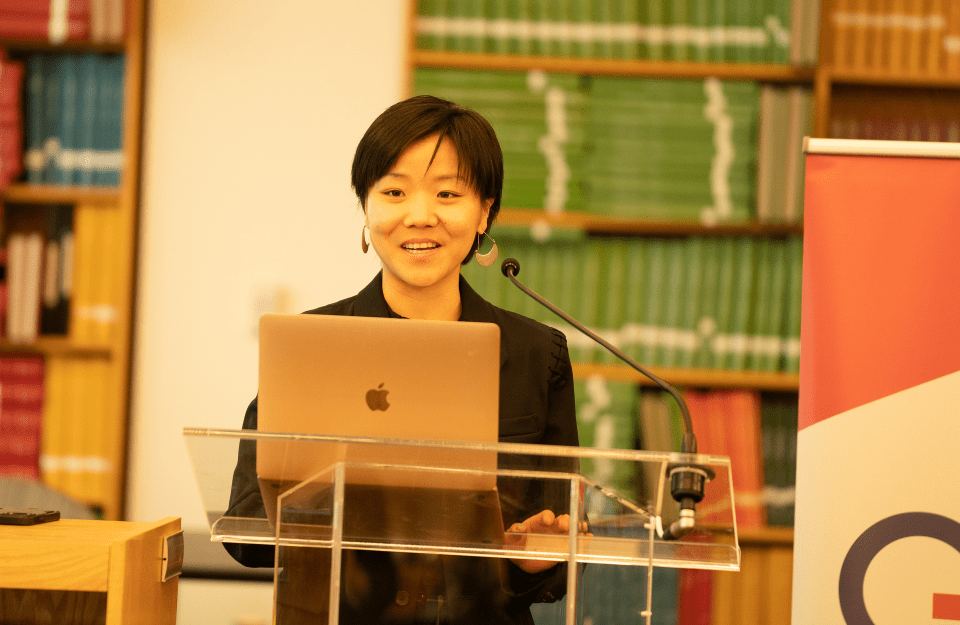Doing Global Media Studies: Theories, Practices, Reflections
A symposium held by the Center for Advanced Research in Global Communication brought global media scholars to Annenberg to share research that transcends borders.

Ennuri Jo, doctoral candidate at the University of Southern California, speaks at CARGC's Doing Global Media Studies Symposium.
This year marks the tenth anniversary of the Center for Advanced Research in Global Communication (CARGC) at the Annenberg School for Communication.
To celebrate the center’s anniversary, CARGC’s biennial fellows’ symposium — this year titled "Doing Global Media Studies: Theories, Practices, Reflections" — brought together scholars from across the world, including many CARGC alumni, to discuss global media, culture, institutions, and infrastructure.
“In a moment marked by deep skepticism about global connections and exchanges, it was wonderful to see a community of early-career scholars come together and insist that every social, cultural, and political problem we face today is shaped by global technologies and practices of communication, and needs a decidedly global approach,” says CARGC Director Aswin Punathambekar.
Over the course of two days, scholars presented research on subjects that span the fields of Communication and Media Studies, from costumes in "Downton Abbey" to data centers in China.
Materialities of the Global South
- Daniella Gáti, assistant professor at New York University Shanghai, presented her research on the internet in China. She encouraged scholars to shift away from the assumption that the U.S. is the benchmark for digital life and to consider global perspectives when doing internet research.
- Ahmed Alwara, doctoral student at Penn State University, shared insights from studying the intersection between broadband policy in Iraq and the experience that rural Iraqis have in accessing broadband.
- Simran Bhalla, a postdoctoral fellow at the University of Southern California, discussed how the period piece “Downton Abbey,” which became a smash hit on Netflix, fails to outright address histories of imperial and postcolonial economic exploitation, even though the television show’s costumes, locations, and sets are direct reflections of this exploitation.
- Ennuri Jo, doctoral candidate at the University of Southern California, meditated on the work of John Akomfrah, a media artist whose film installations explore climate change, colonialism, migration, ecology, and exploitation.
Global Media Territories
- Tony Cho, doctoral candidate at University of California at San Diego, presented research on the U.S. Army's abandonment of military bases in Korea and how efforts to “return” this land to Korea continue to remind citizens of how the state is intimately tethered to U.S. militarism.
- Stephen N. Borunda, doctoral candidate at the University of California at Santa Barbara, shared his research on the site of the world's first nuclear explosion — Trinity Site in New Mexico — and the implications for the 40,000 people residing in the surrounding counties, many of whom were Indigenous, Mexican, and Chicanex.
- Tinghao Zhou, doctoral student at the University of California at Santa Barbara, presented his research on a cluster of data centers in Gui’An New Area, a state-sanctioned experimental area in China.
- Fengyi Yin, doctoral student at Temple University, presented research on media representations of Chinese-owned mining projects in Zimbabwe
Transnational Activism and Archival Practices
- Sima Kokotovic, doctoral candidate at Concordia University, presented his research on the relationship between filmmakers, archival film researchers, media makers, and film festival organizers in the wake of the 2008 financial crisis.
- Amal Shafek, doctoral candidate at the University of Texas at Dallas, shared the story of “The Between Women Filmmakers Caravan” — an initiative founded by women in Cairo that organizes festivals, online screenings, and translations of films by women filmmakers.
- Steven Wang, postdoctoral researcher at the University of Kansas and Yilan Wang, J.D. candidate at Brooklyn Law School, presented research on danmei (耽美), a genre of media romanticizing male homosexual relationships that obscures the sexual component of these relationships to bypass media censorship policies in China.
- William Lafi Youmans, associate professor of Media and Public Affairs at George Washington University shared his multimodal project digitizing programs from "Arab American Television," a Los Angeles-based news and media syndicate that produced a weekly bilingual, magazine-style show throughout the 1980s and 90s.
Reshaping Global Markets Through Cultural Production
- Bizaa Zeynab Ali, doctoral student at New York University, explored the idea of "creative ambivalence" in the Global South. She used the example of “Coke Studio Pakistan,” a television miniseries produced by the Coca-Cola Company that features recorded concerts by Pakistani musicians.
- Yasemin Celikkol (Ph.D. ‘21), global postdoctoral fellow at Northwestern University in Qatar, addressed how the popularity of Turkish television shows, which are being streamed throughout the globe, gives Turkey “soft power” by encouraging tourism and countering negative stereotypes about Turkish people.
- Madison Mellon, graduate student in the Cinema and Media Studies department of the University of Southern California, explored the politics of animated television shows that push the boundaries of LGBT+ representation in media and advocate for progressive social change.
- Jaana Serres, postdoctoral researcher at the University of Groningen, examined the relationship between music production and advertising on digital platforms in Nigeria.
Exporting Global Nationalisms
- Veronika Hermann, assistant professor at Eötvös Loránd University, presented research on the global distribution of Eastern European television series like “The Informant” and how they portray political thought.
- Seung-Hoon Jeong, assistant professor at California State University, Long Beach, explored how anti-capitalist media thrives in capitalist markets, by examining the success of the Korean TV show “Squid Game” on Netflix.
- Nisarg P. (નિસર્ગ પી.), doctoral student at the University of Southern California, presented his investigation of the Western reception of the Indian Telugu-language action film “RRR.”
- Nansong Zhao, M.A. student at New York University, shared his research on the development of the Chinese video game industry in the 1990s-2000s.



